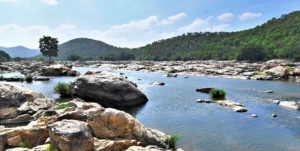The Dravida Munnetra Kazhagam (DMK), a prominent political party in Tamil Nadu, has ignited a contentious debate in Karnataka by including its opposition to the Mekedatu project in its election manifesto. The Mekedatu project, proposed by the Karnataka government, aims to construct a reservoir across the Cauvery River to address water scarcity and generate hydroelectric power. However, the DMK’s stance against the project has stirred controversy in Karnataka, triggering a heated exchange of opinions among politicians and citizens alike. This article seeks to provide an in-depth analysis of the controversy surrounding the Mekedatu project, exploring the perspectives of various stakeholders, examining the political implications, and elucidating the significance of the issue for both states.

The Mekedatu project, located in the Ramanagara district of Karnataka, envisages the construction of a reservoir near the confluence of the Cauvery and Arkavathi rivers. The proposed reservoir, with a storage capacity of over 66 thousand million cubic feet (tmcft), aims to harness the surplus water during the monsoon season for irrigation, drinking water supply, and hydropower generation.
Proponents of the Mekedatu project argue that it will address the perennial water shortage in the Cauvery basin, benefiting farmers and communities in Karnataka. They contend that the project will enhance water availability for irrigation, thereby increasing agricultural productivity and rural livelihoods. Additionally, the hydropower generated from the reservoir is expected to contribute to Karnataka’s energy security and economic development.
However, the Mekedatu project has encountered vehement opposition from Tamil Nadu, which shares the Cauvery River with Karnataka. Tamil Nadu contends that the project will adversely affect its downstream water requirements and violate the Cauvery Water Disputes Tribunal’s (CWDT) award, which governs the sharing of Cauvery river waters among riparian states.
Critics argue that the construction of the Mekedatu reservoir will reduce the flow of water to Tamil Nadu during crucial periods, exacerbating water scarcity and disrupting agricultural activities in the delta region. Tamil Nadu has raised objections to Karnataka’s unilateral decision to proceed with the project without obtaining the necessary clearances from the concerned authorities and consulting the downstream states.
The DMK’s decision to include its opposition to the Mekedatu project in its election manifesto has reignited tensions between Karnataka and Tamil Nadu. The party, which is contesting the upcoming assembly elections in Tamil Nadu, has vowed to oppose any attempt to implement the Mekedatu project, asserting that it would adversely impact Tamil Nadu’s water interests.
The DMK’s stance on the Mekedatu project reflects its commitment to safeguarding Tamil Nadu’s rights and interests in the Cauvery river waters. The party has accused the Karnataka government of unilateralism and disregard for the principles of federalism and interstate cooperation in its pursuit of the project.
The DMK’s opposition to the Mekedatu project has elicited strong reactions from political leaders and parties in Karnataka, who view it as an infringement on the state’s sovereignty and development aspirations. The ruling Bharatiya Janata Party (BJP) and opposition parties such as the Indian National Congress (INC) have criticized the DMK’s stance as politically motivated and detrimental to Karnataka’s interests.
The controversy surrounding the Mekedatu project has assumed significance in the context of the upcoming assembly elections in Karnataka, with politicians seeking to capitalize on the issue to mobilize support and sway public opinion. The Karnataka government has reiterated its commitment to implementing the project, emphasizing its potential benefits for the state’s economy and water security.
The controversy over the Mekedatu project has sparked a spirited debate among citizens and civil society organizations in both Karnataka and Tamil Nadu. While some residents of Karnataka view the project as essential for addressing water scarcity and promoting regional development, others express concerns about its environmental impact and potential displacement of communities.
Similarly, in Tamil Nadu, there is widespread apprehension about the project’s ramifications for the state’s agricultural economy and water security. Farmers and activists have called for a united front against the Mekedatu project, urging the Tamil Nadu government to take decisive action to protect the state’s water rights and interests.
The controversy surrounding the Mekedatu project underscores the complex interplay of political, legal, and environmental factors in interstate water disputes. While Karnataka seeks to address its water needs and promote development through the project, Tamil Nadu remains wary of its potential repercussions on its agricultural economy and water resources.
The DMK’s opposition to the Mekedatu project reflects broader concerns about interstate water sharing and the need for equitable and sustainable management of river resources. As the debate continues to unfold, it is imperative for stakeholders in Karnataka and Tamil Nadu to engage in constructive dialogue and seek mutually acceptable solutions that uphold the principles of justice, equity, and cooperation. Ultimately, the resolution of the Mekedatu controversy will have far-reaching implications for the relationship between the two states and the future of interstate water governance in India.





